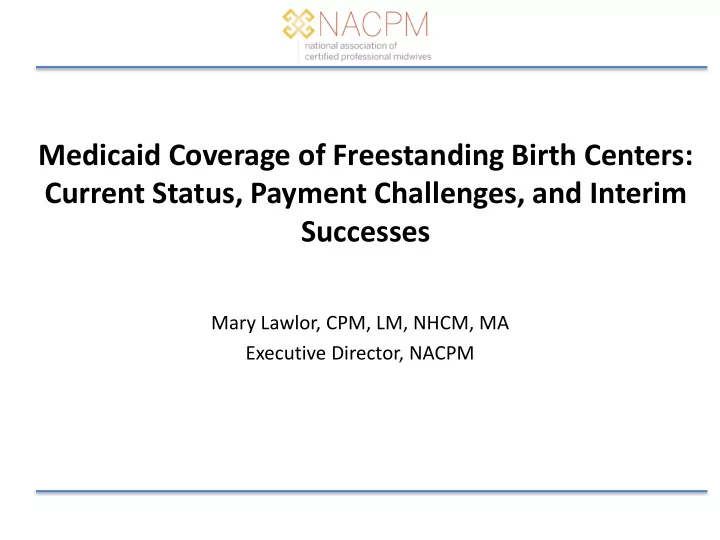

Medicaid Coverage of Freestanding Birth Centers: Current Status, Payment Challenges, and Interim Successes Mary Lawlor, CPM, LM, NHCM, MA Executive Director, NACPM
Agenda • Overview of Affordable Care Act (ACA) Medicaid FBC Coverage Requirement (Sec. 2301) • Issues with Patient Choice and Access to FBCs and Licensed/Recognized Providers – Inadequate or Inconsistent Implementation of ACA Mandate • Meeting with CMS Officials and Ensuing Discussions • Actions as a Result of Collaborative Dialogue with CMS – CMS’ Recent Promulgation of Clarifying Guidance to State Health Officials – Provision of State- Specific ‘Issues’ Chart to CMS for Technical Assistance, Compliance Follow-up – Ongoing ACA Implementation-related Discussions • Next Steps, Discussion 2
Overview of ACA FBC Requirement • ACA (sec. 2301) requires Medicaid coverage of FBC services in states that recognize FBCs and provides separate payments to the facility and to providers, such as midwives, licensed or recognized under state law • CMS’ Mar. 25, 2011 informational bulletin reiterates provision’s effective date upon enactment (Mar. 23, 2010) – Limited exception for states requiring legislation (the window of which has since lapsed) • Despite 2011 CMS bulletin, inadequate and inconsistent implementation persists – Only 30 states (of 42 that meet statutory criteria) submitted SPAs to come into compliance with sec. 2301 (per Medicaid.gov data as of Jan. 2016) • 12 states that license FBCs appear not to have submitted SPAs – AK, CT, HI, KS, OK, MN, NH, NV, TN, and UT (AR and NM submitted SPAs as not licensing FBCs but now they do) (Ibid) – Significant issues with Medicaid MCOs not meeting CMS requirements: • All managed care plans must provide coverage of the individual services provided in a FBC (but not every MCO must have a FBC under contract); and • CMS requires the inclusion of a FBC in the network of at least one managed care plan available to each beneficiary 3
An All Too Familiar Story: Barriers to Accessing Medicaid FBC Services (Select Examples) • Issues pertain to Medicaid FFS and Medicaid managed care programs • Denial of contract because “similar services” are provided at local hospital, or because the Medicaid MCO already has maternity care providers – no birth center in network • Refusal to renegotiate existing contract when costs change • Denial of professional services payment to licensed midwives • Delay of reimbursement for 6-12 months requiring multiple appeals • Contracting declined because FBC cannot obtain transfer agreement with local hospital • Large networks or IPAs have all the contracts and Medicaid MCOs refuse to work with smaller, independent providers 4
Overview of Meeting with CMS • Earlier this year, NACPM – joined by AABC and ACNM – convened a meeting of over a dozen CMS officials to discuss ACA FBC implementation issues – Among them: Tim Hill, Deputy Center Director of the Center for Medicaid and CHIP Services (CMCS); and Ellen Marie Whelan, NP, PhD, FAAN – Senior Advisor, Center for Medicare & Medicaid Innovation (CMMI) (advisor to Strong Start initiative) • Our ‘ask’ of CMS: issue regulations to ensure beneficiaries’ choice and access to statutorily-mandated FBC services – Guidance is necessary to elucidate ACA requirements, including new terms of art and separate provider payments – It is especially important to ensure that Medicaid MCOs provide this important coverage, and specifically, that they understand: • Hospital care is not the same as FBC care and cannot be used interchangeably • FBC reimbursement includes both a facility and professional component • Any birth attendant (midwife) licensed in the state is to be reimbursed the professional services • Conveyed our willingness and enthusiasm to continue to partner with CMS 5
Resulting CMS Clarifying Guidance • Last April, CMS issued guidance addressing FBC network sufficiency standards applicable to Medicaid MCOs – Broader guidance also clarifies certain Medicaid and CHIP managed care payment methodologies for federally-qualified health centers (FQHCs) and rural health clinics (RHCs) • CMS says it tried to ensure equity with state plan enrollees by requiring that the individual services offered by FQHCs, RHCs, and FBCs were made available to all Medicaid managed care enrollees as mandatory services (to the extent the state licenses or otherwise recognizes RHC and FBC providers under state law) • However, to better ensure access and consistency with the statute, CMS now states that: “…[F]or managed care contracts starting on or after July 1, 2017 that include FQHC, RHC, or FBC services, CMS will not approve the contracts unless each managed care plan includes at least one FQHC, one RHC, and one FBC (to the extent the state licenses or otherwise recognizes RHC and FBC providers under state law) in the provider network, where available, for the managed care plan’s contracted service area. When FQHC, RHC, and FBC services are not included under a state’s managed care contracts, the services must be provided or arranged by the state directly” (emphasis added). 6
Next Steps, Ongoing CMS Dialogue • NACPM/AABC/ACNM provision of chart to CMS outlining state-specific compliance issues (FFS and MCO) related to the ACA birth center coverage mandate • Ongoing use of chart by CMS in state-level discussions re: ACA implementation as well as delivery system reforms • Additional forthcoming follow-up with CMS re: remaining implementation issues in the wake of the April 2016 guidance 7
Recommend
More recommend